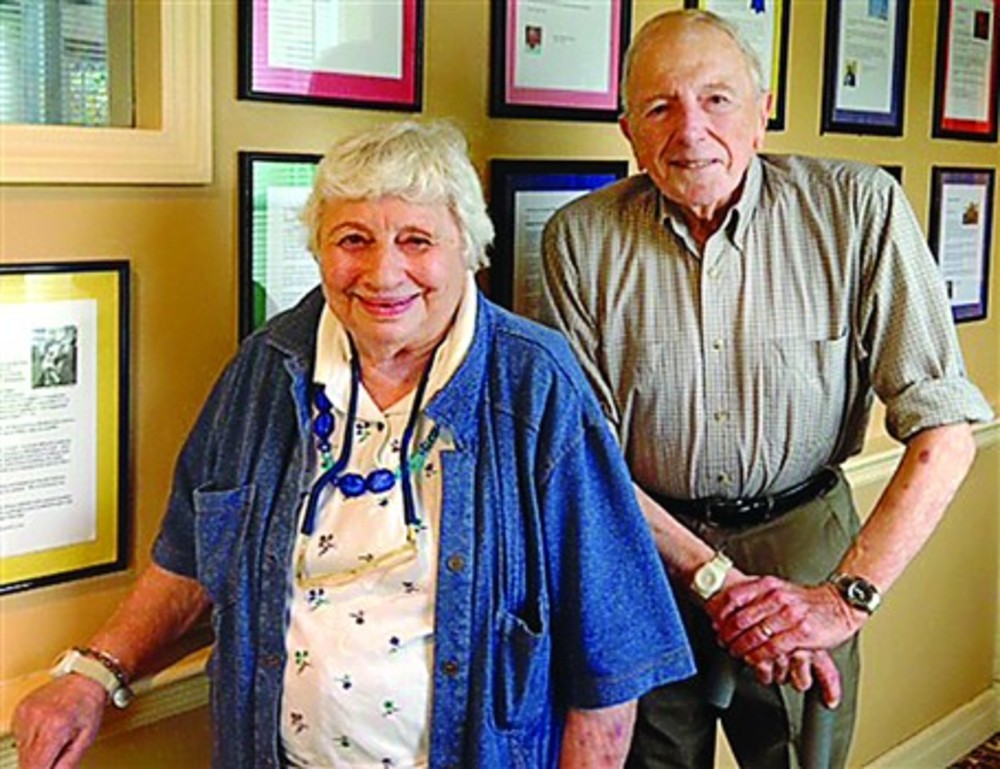Memoir writing helps seniors preserve family history
 Memoir group participants Morton Paige and Lillian Siegel. /Karen Ferranti
Memoir group participants Morton Paige and Lillian Siegel. /Karen Ferranti
In a new memoir writing group, residents at EPOCH on the East Side are recalling faded memories to write prose under the guidance of Rita Watson, a PsychologyToday.com and Providence Journal columnist. In April she joined EPOCH on the East Side as a part-time receptionist, after cutting back on academic work to begin writing books. Watson, who has a master’s degree in public health, previously served as education and policy director at Yale and later for a group with the Harvard Consortium of teaching hospitals.
Initially, many of the residents and staff didn’t realize Watson was a professional writer, but when they started seeing her name in the paper, they put two and two together. Watson had been writing memoirs about her grandparents for The Journal; EPOCH’s Life Enrichment Director Karen Ferranti asked, “Will you do something like this for us? We would love it.”
Watson happily agreed, excited to help residents write memoirs so they could pass them down to their children and grandchildren. Since it first began earlier this summer, the memoir group has been well received by the residents. One of the first participants was Sylvia Denhoff who continues to attend memoir group meetings.
“I tried it and was inspired,” Denhoff said. “Rita brings out the memories we have forgotten about. There are things I remember in her class that I really should have written down long ago.”
For example, memories of her late husband inspired her first piece in the class. “I had a fabulous husband. He was a pediatrician but he loved to cook Chinese food. And we’d have dinner parties where people would leave and say, ‘when are you cooking again?’ Because of Rita, that came back to me and I wrote about it,” Denhoff said.
The memoir class has become a wonderful way not just for the residents to resurrect cherished memories, but also to connect with loved ones and create a legacy. Watson and Ferranti began framing the stories and hanging them up on one of the community’s walls, which helped spur conversations about family history.
“My granddaughter was here from Boston, and I showed her the articles on the wall,” Denhoff said. “She was fascinated to know about her grandfather’s cooking. Somehow we had never discussed it.” But thanks to the stories inspired by the memoir group, Denhoff’s granddaughter now knows more about her grandfather.
Another regular of the memoir group, Mort Paige, finds similar value in the group’s potential to preserve family history. “I like to write down memories because I want my children to know things that I’ve forgotten or never told them. When I’m not here, they’ll know what actually happened to me and all the things that I thought were important,” Paige said.
Watson coaxes these kinds of cherished memories out through creative writing prompts. She might share a few stories of her own or provide topics to inspire. She’s asked people to share stories about their summers growing up as well as the things they’re grateful for – a theme she frequently covers for PsychologyToday.com.
Sometimes, those prompts make people think outside the box. For example, when she asked, “What do you love about freedom,” Paige was reminded of a time when he lost his voice for nine months, motivating him to write about the freedom to talk and sing.
Another young woman was inspired to write about her June wedding when Watson asked about summer stories. “She wrote the most beautiful story about her wedding, and described in detail the gown,” Watson said.
The seniors handwrite their memories then share them with Watson, who types and edits them as needed. But, she says, the latter is rarely necessary: “I’m so impressed.
Once a story is finished, Watson finds a photo to accompany it, frames it and hangs the finished product in what’s become the memoir gallery. Eventually, Watson and the burgeoning writers may compile the stories into a book. “Everybody has written something meaningful,” she said. “I have to give [Executive Director] Jean Costa so much credit for letting us do this project because people have such wonderful stories to share.”
Memoir writing can be a fruitful practice – it helps awaken precious memories, preserve family history and connect you with loved ones. Additionally, writing helps stimulate the brain, which can improve focus, help aging adults maintain reasoning skills and, ultimately, hold onto their independence longer.
If you’re a senior living in the area and are interested in trying Watson’s memoir group, call Life Enrichment Director Karen Ferranti: 401-275-0682.
Melissa Brooks is a writer who frequently covers senior activities, issues and events.







